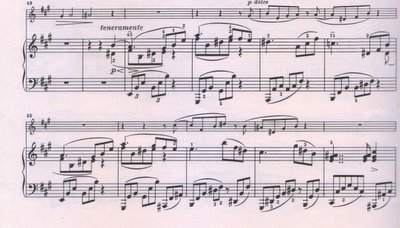It is always the same street, the same stores. A city built in an impersonal grid, a series of numbers, with retail locations that shift and vanish, would seem to perversely discourage affection and attachment. But there is just enough persistence. For example: one night five or six years ago, I learned that my wonderful teacher Gyorgy Sebok had died, after a sudden illness. I was (obviously) very upset, and I sat in this very apartment playing some of his old recordings; my then-significant-other came by, and I was telling her what had happened, when the music came to the second theme of the A Major Brahms Violin Sonata (with Grumiaux):

I shudder at the prospect of "characterizing" his playing, which was always semi-miraculous to me, impossible, superhuman; he also cultivated this otherness, a kind of mystical distance. Of course this comes to you through the lens of a student's awe (still a student when I think of him). But many other, even skeptical, students also felt this same awe, for example, when he played the opening chords of the Franck Sonata; he could draw on irreproducible colors; make even this (!) common piece sound like a spiritual quest. But against this otherness, and against his search for beauties in the simplest melodies, his playing posed a tremendous restraint; he was always careful not to do "too much," according to stylistic antennae he kept well-honed; I don't want to say "classical" and yet a certain proportion was always important to him; he had an allergy to excess.
And so this theme of Brahms sprang upon me like a trap. It is the place in the rather traditional, classical movement... coming after some rather "stodgy" (forgive me, Johannes) transitional material, where Brahms chooses to soar, or release; the theme sits at the edge of sentimentality; it is just Romantic enough. It is so beautiful, but, because Brahms must, he preserves almost against its beauty some compositional craft: the hemiola of the melody against the prevailing 3/4; the dialogue with the little countermotive; the carefully plotted bassline; the rests in the left hand in each measure, preventing the triplets from total motion, keeping the melody to some extent in fragments: not utterly letting go. It seemed, in a way, as must be clear, almost a musical portrait of Mr. Sebok, and the way he was playing it, to my bereaved ear, was like a man looking in a musical mirror. It was pure, you heard all the intervals, all the bass notes, precise but tender; and I saw him again in his little studio, with portraits of Bartok and Liszt, looking at me with disappointment, lifting my left arm to find its independence, trying to pry my single-track student's ear open.
Brahms lets go, this time he lets the triplets continue, and the tender phrase surge:

The recording continued: my teacher didn't hold back, he surged as Brahms did, not superhuman at all but now really really human, and (wonderfully) rushed, and with his tremendous control, with a left hand of granite, played a shattering climactic note. And that was it for me, exactly, precisely that note (possibly the saddest note in this joyful piece); I broke down just then, mid-explanation, and the CD player was turned off and my T-S-O sat with me for a long time, until I was relatively quiet, and eventually she wanted me to eat something, and we agreed to go to Popover's Cafe, several blocks down from me on Amsterdam. And for a couple of hours I ate a steak and stared across the table at her and talked slowly. And I have not been back to Popover's since.
But, every time I come up Amsterdam in a taxi, it is there, on the home stretch to home. Sometimes it is late enough; the place is dark. But sometimes of course it is still open, well-lit, and I can see some other couple sitting at that table talking about whatever.
This is just the most intense of my Amsterdam landmarks. There are so many more, places where I forgot, met, said goodbye to... reminders, warnings, any number of verbs and moments; there is the restaurant owned by the weird guy's mother; the bar where I read Proust; the place you met the person you never see anymore; etc. etc. and the tornado set up by these associations is getting stronger by the year, so that I spend the entire bumpy ride in an emotional state, buffeted, overwrought. Also, my building is going condo. Perhaps the confluence of these two signs: time to move? I could cab back home down unfamiliar streets; I could impose my memories on other, unsuspecting, restaurants.

No comments:
Post a Comment